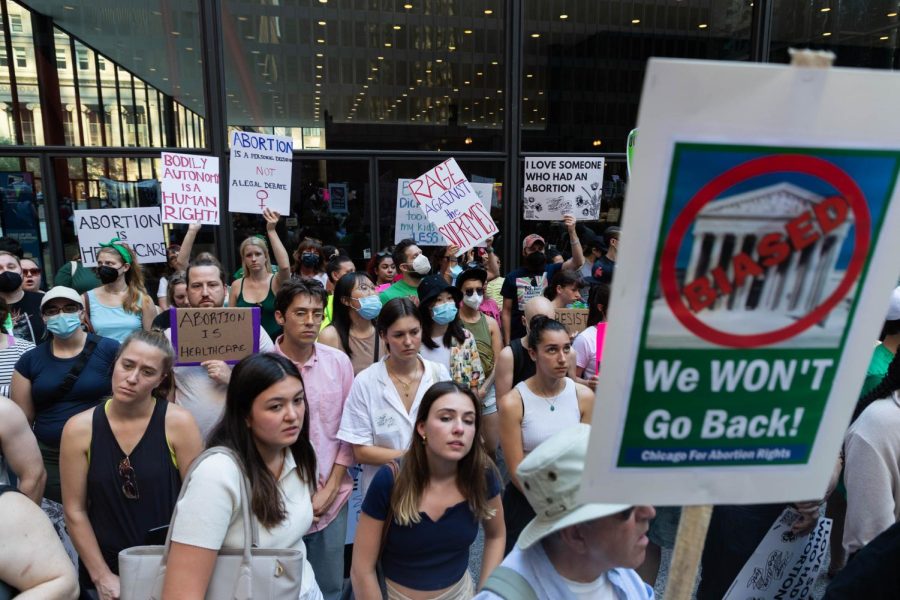After Roe v. Wade struck down, thousands of Chicagoans took to the streets
June 27, 2022
Chicagoans gathered early, some seating themselves on the marble benches that lined the Adams Street perimeter of Chicago’s Federal Plaza, preparing to vocalize their opinions after Friday’s announcement by the U.S. Supreme Court that Roe v. Wade was overturned.
By the time the event started, protesters stood shoulder to shoulder, eager for what flyers called the “Chicago for Abortion Rights: We Won’t Go Back” emergency protest and rally to begin.
At the rally, Gov. J.B. Pritzker spoke to the Chronicle and said it was an awful day for women and the country.
“Our democracy is being torn down by an extremist court, chosen by Donald Trump, to take away reproductive rights and so many others,” Pritzker said. “It’s not just going to stop here. They’re going to go after marriage equality and birth control. This is a devastating moment, and that’s why we all have to come out to protest and vote. This election may be the most important vote of our lifetimes.”
Roe v. Wade allowed a basic right to privacy via the due process clause of the 14th Amendment that protected a person’s right to choose whether to have an abortion or not, but the right was not absolute. Roe also protected the balance between governmental concern and the protection of health and prenatal life.
On Friday, the Supreme Court voted to overturn the 49-year-old U.S. Supreme Court decision on Roe v. Wade, taking away the guarantee of a woman’s right to an abortion in the United States, leaving the decision to allow abortions up to each of the 50 states.
In his concurring opinion released Friday, Supreme Court Justice Clarence Thomas said high court rulings establishing gay rights and access to contraceptives should also be reconsidered.
Pritzker said Illinois was prepared for the repeal of Roe based on the Supreme Court’s leaked opinion in advance of the ruling. Despite the court’s decision, abortion remains legal in the state, and Illinois will provide safety for those seeking the procedure.
According to Politico, abortion is now illegal — “or soon to be” — in 16 states, with additional states labeled “legal for now.”
Protester and Geneva resident Nila Kannankeril, 26, said they are extremely angry about the decision, yet galvanized at the same time.
“I am motivated to fight for abortion access for everybody, not just women. Everyone uses women as the primary term; I am nonbinary, and I also need abortion access,” Kannankeril said. “It’s extremely important to include anybody that needs abortion access, and I’m happy to be here to do that.”
Kannankeril is close to graduating with a master’s degree in nursing, specializing in labor and delivery. In the future Kannankeril wants to get a nurse practitioner license and a doctorate in order to provide abortion access directly.
Brii Petty, 26, from Glenview said she was “pissed as all hell” about Roe’s reversal. She said Supreme Court justices, who are appointed, not elected, should not be making decisions for everyone and that they face little consequence for decisions since they are appointed for life.
“They, their mistresses, wives, daughters, family and friends will always have access to [reproductive rights] because they have the means,” Petty said. “I have plenty of friends who live in conservative states who are trapped there because they don’t have the means to move.”
Aviva Levine, 25, from Chicago came to the protest with the Party for Socialism and Liberation’s Chicago branch.
“I really think it’s appalling when you consider the majority of this country by any opinion poll is in support of Roe v. Wade,” Levine said. “If you want my real opinion, I think the Supreme Court should be abolished. As an anti-democratic institution, I don’t see any reason for it to exist.”
Levine said President Joe Biden’s power to enact executive orders could defend abortion rights, but he’s failed to act.
Particularly concerning to protesters like Levine was what life after Roe v. Wade will look like for minorities and members of the LGBTQ+ community.
“When we see abortion rights being attacked like this, it’s LGBTQ people [and] communities of color who are predominantly the most hit economically,” Levine said. “They are unable to get out of the areas they live in to find abortion centers because they’re being shut down in states like Texas and Oklahoma.”








